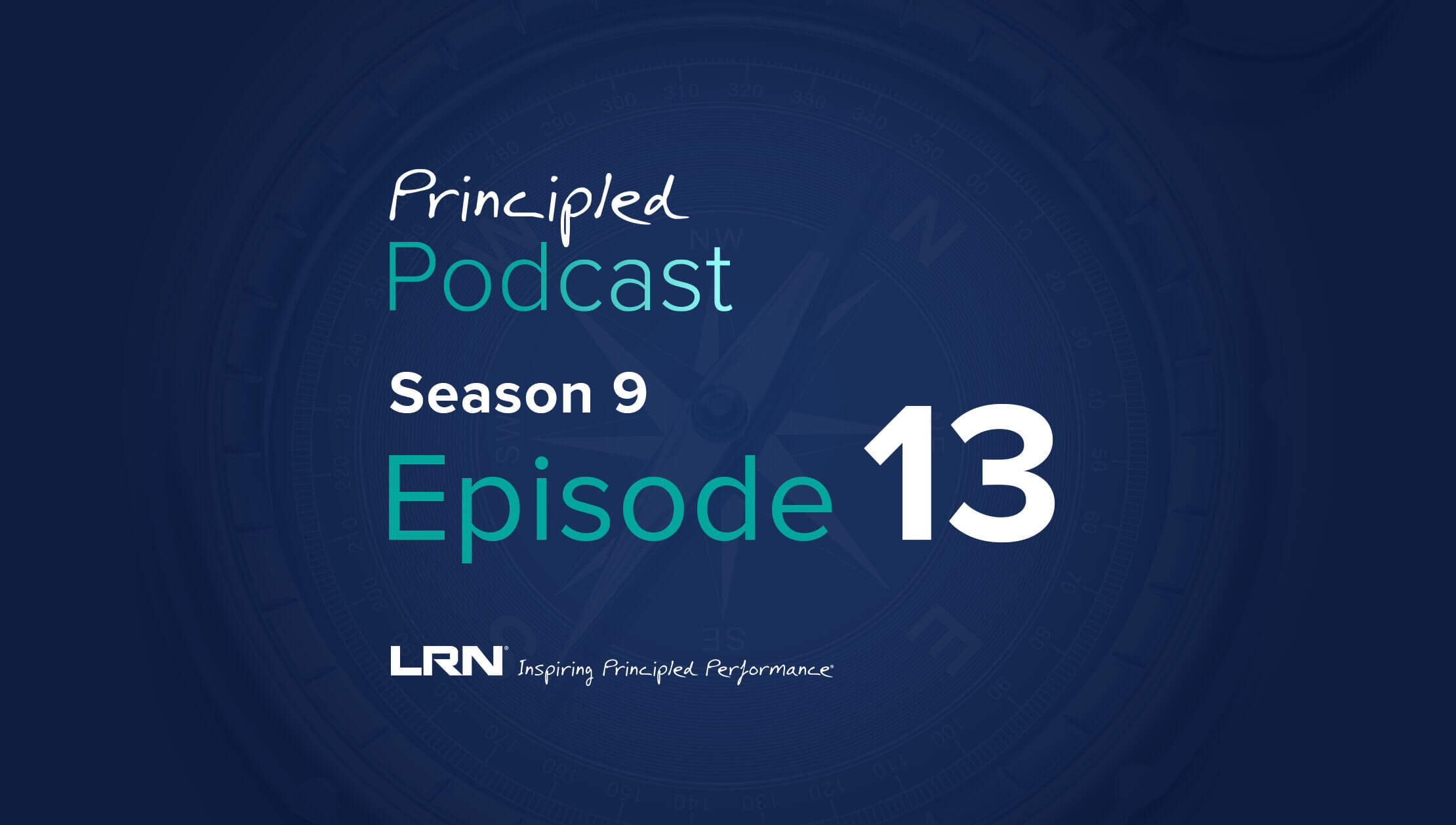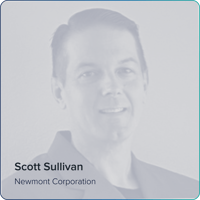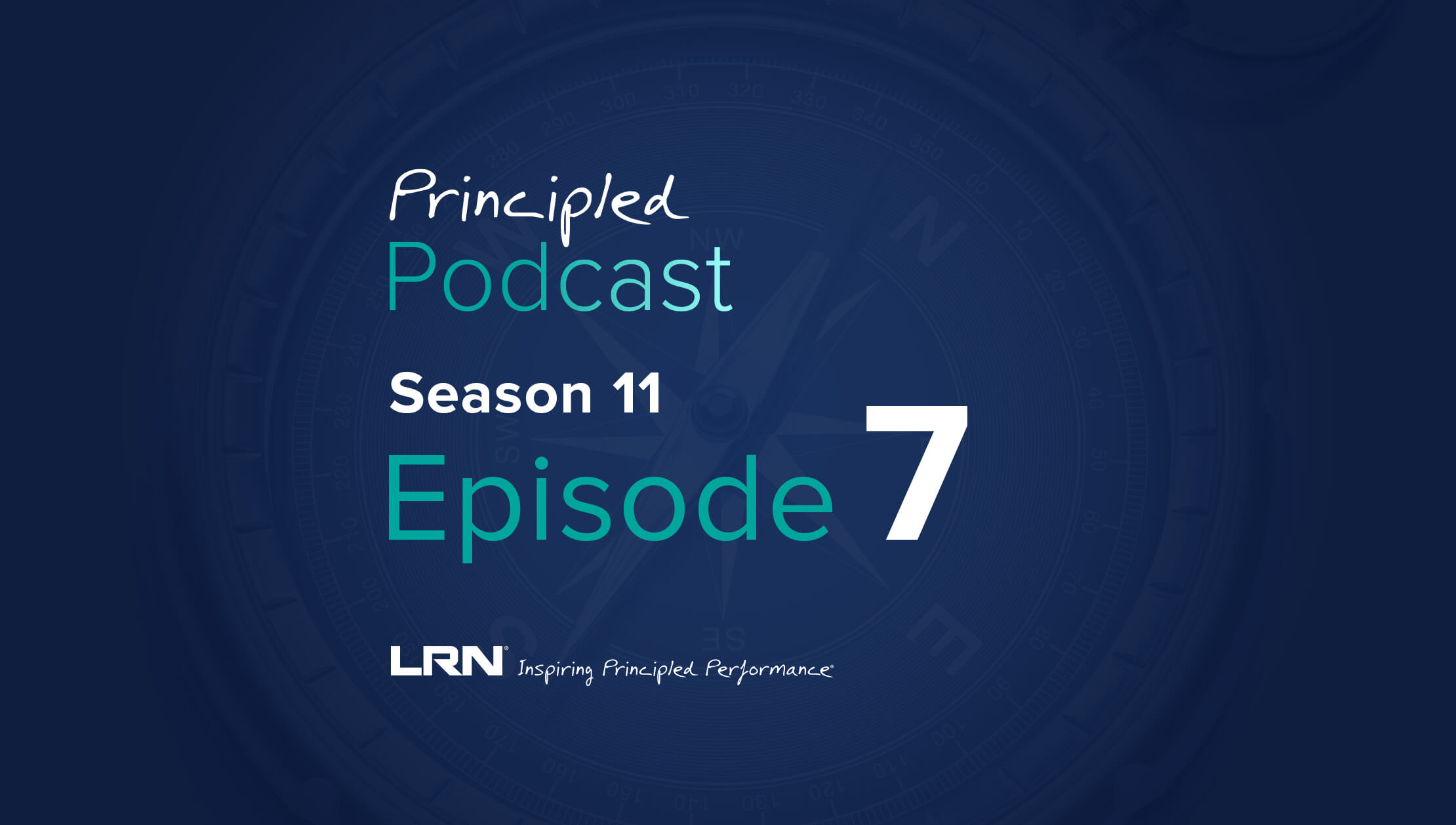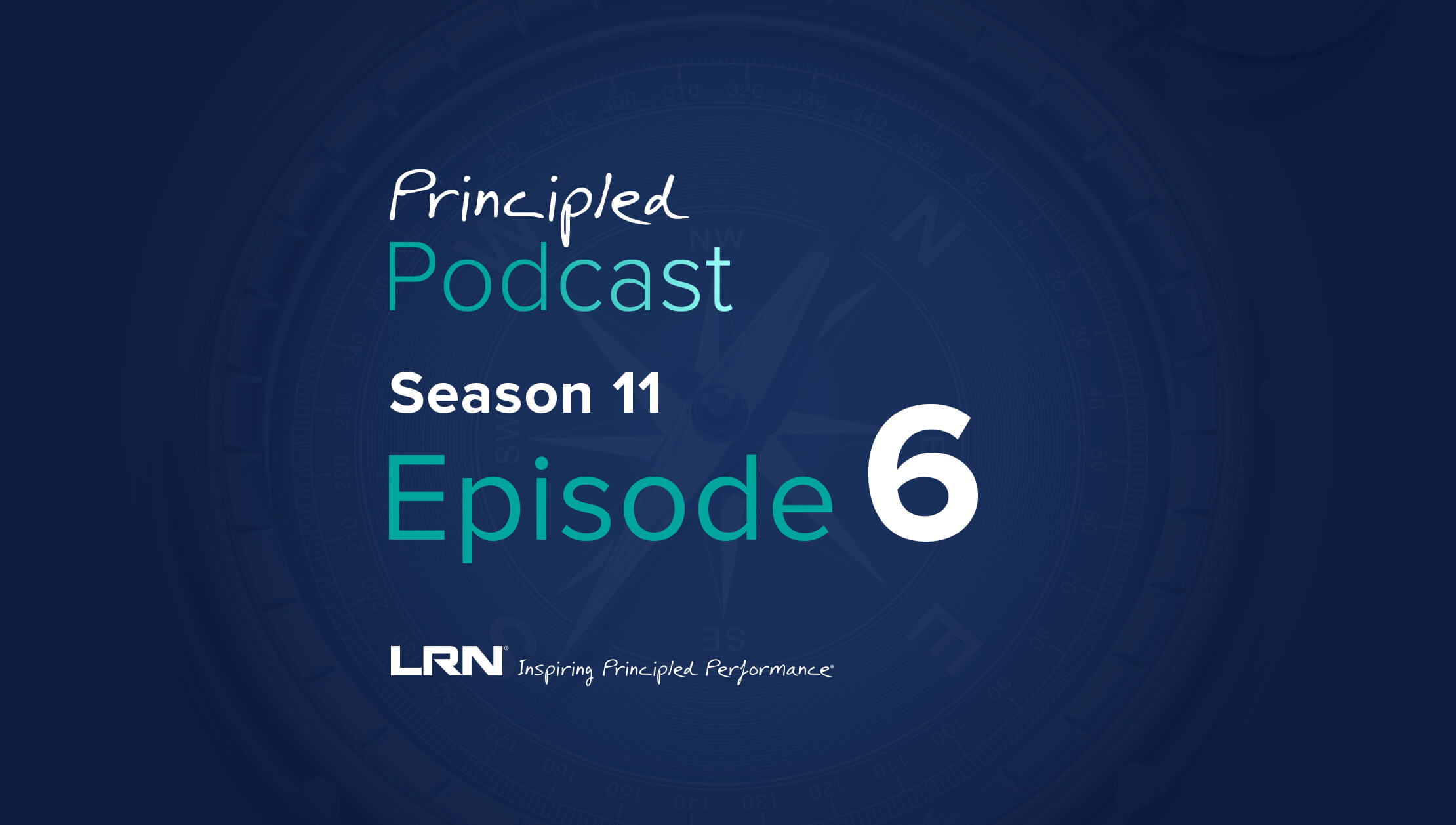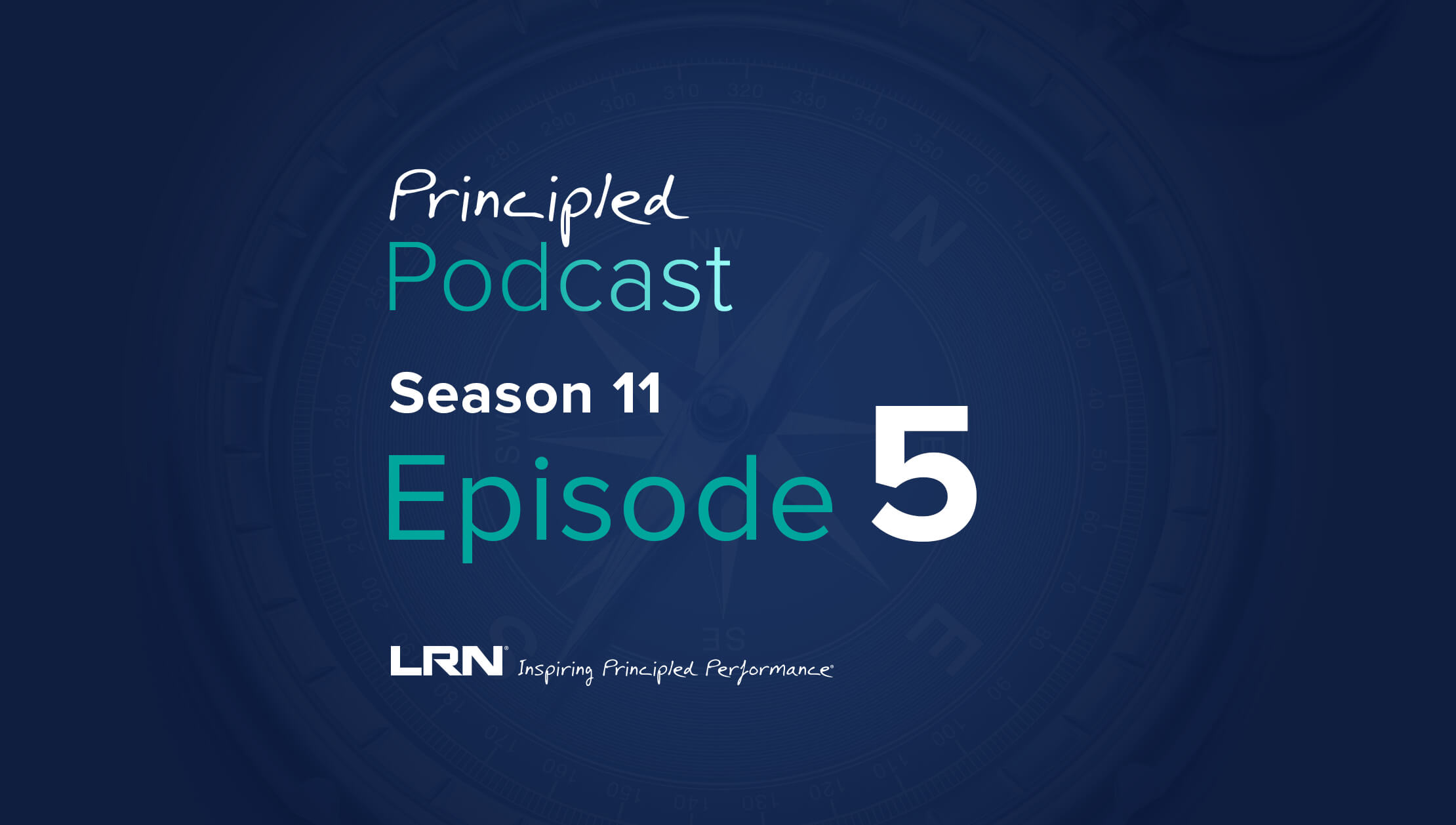What you'll learn on this podcast episode
Do hotlines really work? According to the 2019 Global Business Survey conducted by the Ethics and Compliance Initiative, only 6% of E&C complaints went to hotlines, compared to 51% to direct supervisors and the remainder to higher management or human resources. So why are so many E&C programs—not to mention boards of directors—relying principally on hotline data to assess company culture and compliance? In this episode of LRN’s Principled Podcast, Susan Divers talks about reimagining hotlines with Scott Sullivan, the chief integrity and compliance officer at Newmont Corporation. Listen in as Scott shares how his team reinvented Newmont’s hotline channel and reporting process to separate the wheat from the chaff and gain meaningful information.
Where to stream
Be sure to subscribe to the Principled Podcast wherever you get your podcasts.
Guest: Scott Sullivan
Scott Sullivan is the Chief Integrity & Compliance Officer of Newmont Corporation, the world’s leading gold company. Newmont has approximately 15,000 employees and 15,000 contractors and has 12 operating mines and 2 non-operated JVs in 9 countries. Mr. Sullivan oversees, develops, implements, and manages Newmont’s integrity and compliance program including ethics, anti-bribery, corporate investigations, and global trade compliance. Previously, Mr. Sullivan was the Chief Ethics & Compliance Officer of a global manufacturer of fluid motion and control products with approximately 17,000 employees operating in 55 countries. Mr. Sullivan has written and contributed numerous articles on compliance programs, anti-bribery/FCPA, export controls, economic sanctions, and other ethics and compliance topics to a variety of publications. Mr. Sullivan is also a frequent local, national, and international speaker, moderator, and conference organizer on compliance, anti-bribery/FCPA, export controls, and economic sanctions.
Susan Divers is a senior advisor with LRN Corporation. In that capacity, Ms. Divers brings her 30+ years’ accomplishments and experience in the ethics and compliance area to LRN partners and colleagues. This expertise includes building state-of-the-art compliance programs infused with values, designing user-friendly means of engaging and informing employees, fostering an embedded culture of compliance and substantial subject matter expertise in anti-corruption, export controls, sanctions, and other key areas of compliance.
Prior to joining LRN, Mrs. Divers served as AECOM’s Assistant General for Global Ethics & Compliance and Chief Ethics & Compliance Officer. Under her leadership, AECOM’s ethics and compliance program garnered six external awards in recognition of its effectiveness and Mrs. Divers’ thought leadership in the ethics field. In 2011, Mrs. Divers received the AECOM CEO Award of Excellence, which recognized her work in advancing the company’s ethics and compliance program.
Mrs. Divers’ background includes more than thirty years’ experience practicing law in these areas. Before joining AECOM, she worked at SAIC and Lockheed Martin in the international compliance area. Prior to that, she was a partner with the DC office of Sonnenschein, Nath & Rosenthal. She also spent four years in London and is qualified as a Solicitor to the High Court of England and Wales, practicing in the international arena with the law firms of Theodore Goddard & Co. and Herbert Smith & Co. She also served as an attorney in the Office of the Legal Advisor at the Department of State and was a member of the U.S. delegation to the UN working on the first anti-corruption multilateral treaty initiative.
Mrs. Divers is a member of the DC Bar and a graduate of Trinity College, Washington D.C. and of the National Law Center of George Washington University. In 2011, 2012, 2013 and 2014 Ethisphere Magazine listed her as one the “Attorneys Who Matter” in the ethics & compliance area. She is a member of the Advisory Boards of the Rutgers University Center for Ethical Behavior and served as a member of the Board of Directors for the Institute for Practical Training from 2005-2008.
She resides in Northern Virginia and is a frequent speaker, writer and commentator on ethics and compliance topics. Mrs. Divers’ most recent publication is “Balancing Best Practices and Reality in Compliance,” published by Compliance Week in February 2015. In her spare time, she mentors veteran and university students and enjoys outdoor activities.
Principled Podcast transcription
Intro: Welcome to the Principled Podcast brought to you by LRN. The Principled Podcast brings together the collective wisdom on ethics, business and compliance, transformative stories of leadership and inspiring workplace culture. Listen in to discover valuable strategies from our community of business leaders and workplace change makers.
Susan Divers: Do hotlines really work? According to the 2019 Global Business Survey conducted by the Ethics and Compliance Initiative, only 6% of ethics and compliance complaints went to hotlines compared to 51% to direct supervisors and the remainder to higher management or human resources. And NAVEX Global's hotline surveys confirmed the ECI's findings. So why are so many ENC programs, not to mention boards of directors, relying principally on hotline data to assess company culture and compliance trends?
Hello, and welcome to another episode of LRN's Principled Podcast. I'm your host, Susan Frank Divers, Director of Thought Leadership and Best Practices at LRN. Today I'm joined by Scott Sullivan, Chief Integrity and Compliance Officer at Newmont Mining, the world's leading gold company with operations in North America, South America, Australia, and Africa. Scott is deservedly known in the ENC community for his innovative ENC programs, including his reinventing of Newmont's hotline.
Scott, thanks for coming on Principled Podcast.
Scott Sullivan: Thanks, Susan. I'm delighted to be here.
Susan Divers: So Scott, before we dive into the hotline, I know it's part of your program and you have a brand name, if you will, called Ask, Listen and Act. Can you describe how that approach works and how it differs from the approach that you took in the past?
Scott Sullivan: Absolutely. So I think while speak up remains forever important and what we do and what we will continue to do, we've really made a concerted effort to shift the paradigm and to shift the burden, so the Speak Up burden from the aggrieved party or the victim to our leaders. So we've really migrated from a speak up-centric culture to one where we ask, we listen, and then we act. So we're focusing on empowering and training our leaders, at all levels, but including most importantly perhaps in the middle, our leaders to intervene and proactively reach out to our employee base.
Susan Divers: That's very impressive because as you know, if you ask people to speak up and then no one really listens or takes action, you're probably worse off than when you started. So as I understand it, you're really asking your managers and your leaders to ask questions in situations where they have a sense that there could be an issue?
Scott Sullivan: Yeah, I think that's the point is to try to get people, sort of beat cops, if you will, probably not a great analogy to use in terms of cops, but sort of get people out into the field. If they're seeing something that doesn't seem right, ask a question, probe a little bit. How are you doing as an individual? Are you seeing any concerns? And it's another avenue to get people to engage and to hopefully create an environment where they feel comfortable to come forward with those concerns.
Susan Divers: Great. That's very impressive.
Well, let's turn to the hotline. As we both know, Sarbanes-Oxley mandated that publicly traded companies have independent hotlines, but what are their limitations? Is your experience consistent with the ECI and the NAVEX findings that suggest that hotline data significantly under reports misconduct?
Scott Sullivan: Susan, maybe before answering that one, I'd like to comment on your introductory question, which is why are so many ENC programs, not to mention boards of directors, relying principally on hotline data to assess company culture and compliance?
I guess the first comment would be, well, we're not doing that. So we also do compliance surveys, dedicated compliance and integrity surveys, and the hotline, which we intentionally rebranded a few years back to the Integrity Helpline, instead of hotline, to stress that it was more than a reporting tool. It's also a proactive question or inquiry tool, which by the way, we actually track as a measure of a healthy speak-up culture, what types of inquiries and when they come in, are they anonymous, et cetera.
So a hotline or a helpline is one data point, albeit it is an important one, but it's really the case management system behind it that's the holy grail. So it's the attempt to capture the one source of truth. So how do you get everything into the case management system regardless of how it comes in, what medium or what channel?
So in many instances, the helpline functions as a clearing house where it's a router of matters. So at our company, we sat down with the various groups that often receive concerns, complaints, reports, et cetera, and we developed what we considered to be in-out protocols. So regardless of how they come in or how they end up coming to us or not to us, how do we make sure that the right things are being put in the helpline?
So to use a simple example with a safety matter, if someone sees a slip and fall and it gets reported into the helpline where there's no real misconduct there, so it gets routed out to the health and safety team. Now in that same scenario, if somebody says, "Oh, don't report that because it's going to look bad for our metrics, impact our numbers or impact our bonus," well, that's something that we deem as an in matter. So we have these protocols, again, about what goes into the system and what doesn't.
We are really agnostic to the channel itself. So we track and monitor the various avenues of reporting as another measure of healthy culture, and we have a very balanced approach between the helpline, between management, and between other, which would be HR, the compliance team, et cetera. At the end of the day, we don't really care if we receive the information via a cuneiform tablet, carrier pigeon, snail mail, proton mail, our site compliance teams. The important part is that we receive the information so we can act on it.
And to your question here, as I alluded to before, if you use the hotline as the sole source, you're missing a lot, and you could be going down wrong paths. And I think the NAVEX benchmark report that recently came out talks about the opportunity of where you have a lot of missed information if you're only using the hotline. I think it's two-times missed reporting if it's only the hotline.
So again, for us, we want people to select the channel or the method which they feel the most comfortable with, so we can get the information in and then we can act upon it. The earlier we learn about something, the better it is for everyone. So it doesn't metastasize, it doesn't become widespread, systemic, incredibly damaging for the individual, for the victim, or for the organization as a whole.
Susan Divers: So if I understand you correctly, you are seeking to capture everything, in a sense, everything that employees are concerned about or feel that they need help with or want to raise. And then that's a great example in the safety space where, if it's clearly something that needs to be treated just as a safety matter, great, but if it raises an ethics and compliance matter, then it stays within your purview and it gets acted upon. Is that correct?
Scott Sullivan: Yeah, I think that's correct. And it's not a turf issue, so it's not trying to pull everything under the sun. It's pulling everything under the sun that's relevant that the parties agree. So with the health and safety team, with the security team, with the HR team, and with the internal audit team, it's making sure that the right matter is going to the right party.
And so even in the situation, for example, we alluded to a minute ago where there's perhaps a pressure to not report on a safety incident, that may come into us, we will recorded, but in all likelihood, as long as the safety person is not implicated, it's going to go back out to safety to review or to investigate. So it's about how do you get the data in one spot so you can rely on that data and not have one-half or two-thirds of the data? Because you might miss the main message and then head down a wrong path with your precious resources.
Susan Divers: Yeah, that makes total sense. So this is a pretty big change, I would think. Have these changes been impactful and do you see the impact on anonymous reporting or on under reporting?
Scott Sullivan: I would say yes to all of the above. We have pretty low rates of anonymous reporting compared to benchmarks. There are some pockets that, of course, are tough nuts to crack, but we've also seen reporting rates significantly rise over the last few years. And so we feel, overall, there is greater trust in the system.
Now, we're not deluding ourselves to believe that people are ever going to feel 100% fully comfortable reporting. Reporting in and of itself is an uncomfortable experience, no matter how nice you make it. It's kind of going to the doctor and you got to get seven shots. But we're doing what we can to try to generate greater trust in the system, in the process, and in the leaders, and it's constant work. It's never ending. You've got to get creative in how you can address the myths about the process, the system, et cetera.
Our helpline process is often branded as a black hole, and that's because in some cases, there may be a need for "secrecy," privacy, confidentiality, and frankly, the time it often takes to resolve these matters, especially when you're in the midst of a spike of cases.
Susan Divers: Yeah, I can understand that, having run an ethics and compliance program, but I also think this is a very effective way to try to overcome that because the more matters you get, the more you can resolve, and word starts to get out that the helpline truly helps and hopefully creates a virtuous circle.
So let's turn to the analytics. I mean, basically it sounds like you're getting much more representative data than the traditional hotline, which typically gets as low as 6% of the actual ENC complaints based on what the ECI said. So that's a real treasure trove of insights waiting to be gleaned. What kind of analytics do you do and how do you screen out junk data?
Scott Sullivan: I think all very good and valid questions. I would say for us, it's still a highly manual process. We're getting better at it. We're trying to think about creative ways that we can separate the wheat from the chaff.
I mentioned a few things that we consider important that we already track and monitor, and the goal is, of course, providing these real actionable insights without the noise. So, how do you cut the noise out so that you're focusing on the right things? And I think as data becomes increasingly more and more available, it's easy to get overwhelmed, easy to get distracted or confused or worse. As I mentioned earlier, you could head down the wrong path with the precious resources you have.
One example that I've seen just as a persistent myth or belief in my 20, almost 25 years, of practicing is the widespread belief that there is bad faith reporting. There's weaponized reporting it. It is very rare. And again, 20, 25 years, I've seen a handful of cases that you're able to prove as bad faith reporting. What often happens, if you think of a full pie, somebody may see 10% of the pie. And of course we're telling people, "Speak up, speak up earlier. Bring the issue to the surface. Don't wait till you're 110% sure." So somebody brings forward something that maybe is 10% of the pie and they may misinterpret or not have all the facts, but that's what we're asking people to do. So, they're following the call to action.
Well, it does periodically happen, but it is often somebody conflates motivation with bad faith reporting. So I have seen in the past where the motive for reporting or the timing may not be the purest of all, but when the underlying facts are there, they're often true.
And so we have a robust and rigorous front-end triaging system that we try to use to ensure that the right matters are escalated, the right ones are handed off to the right companion functions. So this cuts down significantly on what we might call the system drag, and counters the myth that we're investigating everything and we've become the stray comment police because you've got to focus on the things that matter. And if there's an employee relations matter, that should be handed off to HR, if there's a safety matter, that gets handed off to health and safety. So we can't be investigating, nor should we be investigating. And there's some things that are appropriate for managers to deal with. So managers need to manage and leaders need to lead. So enabling and empowering them to do that is a really important part of the healthy process as well.
Susan Divers: Yeah, it certainly sounds like it really has created a healthy means of raising concerns because a lot of times people aren't sure, as you point out, with the 10% of the pie, but encouraging them to come forward and then seeing if there's a there there is certainly better than letting it metastasize too.
So what about Newmont's Board of Directors? I was just looking at our Annual Program Effectiveness Report that we do every year at LRN, and many boards of directors unfortunately rely upon things like hotline reports and training completions. Does your board of directors feel that it's getting better insight?
Scott Sullivan: Yeah. I mean, I think in general, they do. I mean, we have a lot of discussions about the data tsunami. So as we alluded to earlier, how do you separate the wheat from the chaff so that we're doing the heavy lifting, so what we're bringing and putting in front of them at the end of the day is the most important data and the insights so that they can understand what's really going on in the organization and provide the oversight and guidance accordingly?
So I would say that's a journey, and we're by no means perfect on that. We're looking for ways to get better at doing that. So we're bringing the most important insights, the most important topics, the most relevant data points to the board and to the audit committee so they can help guide us through the process.
Susan Divers: Well, again, that has to contribute to the health of your ethical culture.
Well, Scott, it turns out we're running out of time unfortunately. It's always wonderful to speak with you, and I hope we can get you back in a couple of months and see how that's working out.
Scott Sullivan: That would be great. Thank you very much for the opportunity.
Susan Divers: My name is Susan Divers, and I want to thank you all for tuning in to the Principled Podcast by LRN.
Outro: We hope you enjoyed this episode. The Principled Podcast is brought to you by LRN. At LRN, our mission is to inspire principle performance in global organizations by helping them foster winning ethical cultures, rooted in sustainable values. Please visit us at LRN.com to learn more. And if you enjoyed this episode, subscribe to our podcast on Apple Podcasts, Stitcher, Google Podcasts, or wherever you listen. And don't forget to leave us a review.
Be sure to subscribe to the Principled Podcast wherever you get your podcasts.
